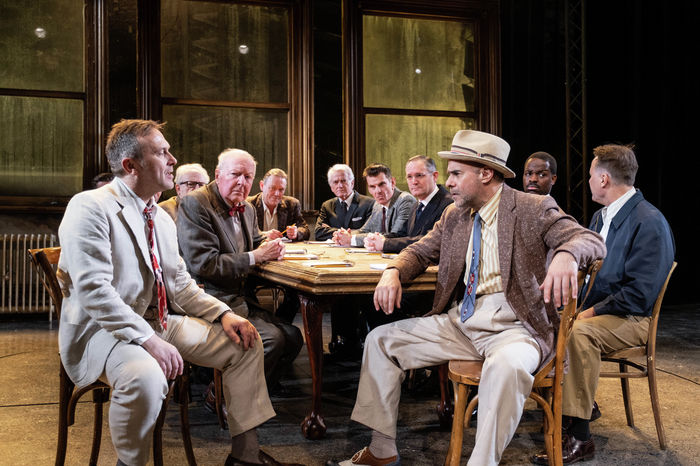Vignettes from an Inkblot Archipelago is an enriching voyage
A fragmentary piece of student writing, Vignettes is a challenging but ultimately rewarding watch

Watching the first scene of Vignettes from an Inkblot Archipelago, I worried about what was to come. Two friends sitting on a hill, talking about the trials of adolescence, their conversation stilted and theatrical… having been informed that Vignettes was about (among other things) masculinity and sexuality, I readied myself for two hours of cliché.
I couldn’t have been more wrong. What started as a seemingly conventional piece of theatre blossomed into a complex meditation on both the privilege and burden of manhood — on art, memory and generational divide. In fact, Charlie McGuire’s writing was perfectly framed to take down cynics like myself, asking pertinent questions about the nature of art and its importance for communication.
“What started as a seemingly conventional piece of theatre blossomed into a complex meditation”
In summary: Alexander (Dylan Stewart) is friends with Charli (Imogen Carter), who wants to be a writer. Alexander’s father (Joe Wright) insists upon his becoming a ‘proper man’, objecting to the poetry he and Charli share. Following the death of his pianist mother (Marta Zalicka), Alexander becomes increasingly tormented. The play follows him into adulthood, as he struggles with the toxic ideals his father instilled.
Structured mainly around one-on-one conversations, McGuire’s play relied heavily on the chemistry between its actors. This was flawless: Stewart and Carter soon fell into a naturalistic flow of conversation, no mean feat given the complexity of emotion in their characters’ relationship. A similarly convincing dynamic was replicated in the second act, with Carter multi-roling as Alex’s wife Shauna. Joe Wright, too, brought a bristling anger to Alex’s dad, believably frustrated and repressed. While the main argument scene between the two escalated a little quickly — the play somewhat fell into the trap of ‘shouting to express strong emotion’ here, which didn’t quite fit in with their dynamic — the parallel drawn between Alex and his father in the second act was one of show’s strongest concepts.
“Charlie McGuire’s writing was perfectly framed to take down cynics like myself”
In this same act, too, Imogen Carter shone as Shauna. Her monologue in ‘the Archive’ — Alex’s study, in which he keeps a record of his life — made for the strongest few minutes of the play. With an acute strain of insecurity in her tone, she discussed her struggle to prioritise herself: to feel that her life, like her husband’s, could be worthy of record. In a show that largely focused on the effects of toxic masculinity in men, this scene was supremely important in acknowledging the knock-on impact of their struggle, grounding it in a female perspective. With her cautious, overly apologetic body language and hesitancy to break the fourth wall (as only Alex had done before in ‘the Archive’), Shauna communicated in an entirely different manner to her husband: a clever supplement to the play’s exploration of gender.
My one criticism would be that Vignettes attempted slightly too much. It engaged with each idea intelligently, but I found myself wishing for more detail, for certain threads of inquiry to be tied up. There were some beautiful reflections on memory (“You can’t change the past by crying at it”, “Clean slates exist to be filled”), but they lacked conclusion in the second act. While, of course, the point of this may have been to capture Alex’s growing disillusionment, it would have been nice to have a more explicit final reflection here. The surround-sound voices, too, were a nice addition, but could have been used more — they got a little lost in the conceptual maze of the play.
At its core, though, Vignettes is a very strong piece from writer-director Charlie McGuire, with equally accomplished performances from all four members of the cast. My cynical past self has been well and truly humbled.
 News / Judge Business School advisor resigns over Epstein and Andrew links18 February 2026
News / Judge Business School advisor resigns over Epstein and Andrew links18 February 2026 News / Gov grants £36m to Cambridge supercomputer17 February 2026
News / Gov grants £36m to Cambridge supercomputer17 February 2026 News / CUCA members attend Reform rally in London20 February 2026
News / CUCA members attend Reform rally in London20 February 2026 News / Union speakers condemn ‘hateful’ Katie Hopkins speech14 February 2026
News / Union speakers condemn ‘hateful’ Katie Hopkins speech14 February 2026 News / Hundreds of Cambridge academics demand vote on fate of vet course20 February 2026
News / Hundreds of Cambridge academics demand vote on fate of vet course20 February 2026










